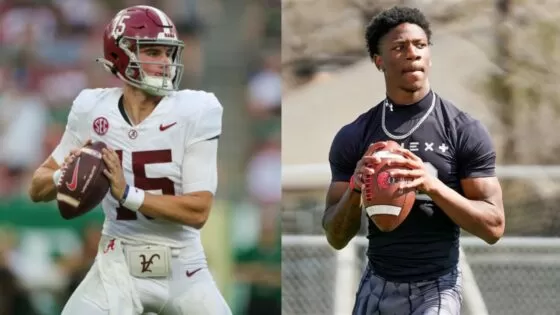Kalen DeBoer’s Blueprint: Building a Team That Can Bend, Not Break
When it comes to football, there are many different strategies and philosophies that coaches use to lead their teams to victory. Some focus on a strong defense, while others prioritize a high-powered offense. But for Kalen DeBoer, the head coach of the Indiana Hoosiers, his blueprint for success is all about building a team that can bend, not break.
DeBoer’s philosophy is simple yet effective: flexibility is key. And this doesn’t just apply to the players on the field, but also to the coaching staff. DeBoer believes in cross-training everyone, giving them dual roles and double duty. This approach has proven to be successful for the Hoosiers, who have seen significant improvement under DeBoer’s leadership.
One of the key areas where DeBoer’s philosophy is evident is in the offensive line. The offensive line is often referred to as the backbone of a team, and for good reason. They are responsible for protecting the quarterback and creating openings for the running backs. And in order to do this effectively, they need to be versatile and adaptable.
DeBoer understands this and has made it a priority to have a flexible offensive line. Players like Olaus Alinen and Michael Carroll are being trained to play multiple positions, from guard to tackle and everything in between. This not only gives the team more options but also allows for a seamless transition in case of injuries or other unforeseen circumstances.
But it’s not just about versatility on the field. DeBoer’s philosophy also extends to the mindset of his players. He wants them to be mentally tough and able to handle any situation that comes their way. This is why he emphasizes the importance of dual roles and double duty. It not only prepares the players physically but also mentally for any challenges they may face.
DeBoer’s approach has been praised by many, including his players. They appreciate the trust and confidence he has in them to take on multiple roles and excel at them. It also creates healthy competition within the team, as players are constantly pushing each other to improve and earn their spot on the field.
This philosophy has also been evident in the quarterback position for the Hoosiers. After the departure of Michael Penix Jr., there were questions about who would take over as the starting quarterback. But DeBoer’s approach of cross-training and giving players dual roles has paid off. Jack Tuttle, who was initially the backup quarterback, stepped up and led the team to a victory in the Outback Bowl. This just goes to show the effectiveness of DeBoer’s blueprint.
But DeBoer’s philosophy is not just limited to the players. He also applies it to his coaching staff. He believes in having a diverse and versatile coaching staff, with each member bringing something unique to the table. This allows for different perspectives and ideas, ultimately benefiting the team as a whole.
DeBoer’s blueprint has not only been successful on the field but has also helped in recruiting top talent. Players are drawn to the idea of being able to play multiple positions and having a coach who trusts and believes in them. This has resulted in the Hoosiers landing highly sought-after recruits, including quarterback Ty Simpson.
Simpson, who was heavily pursued by top programs like Alabama and Clemson, ultimately chose Indiana because of DeBoer’s philosophy. In a recent interview, Simpson’s high school coach, Ryan Grubb, revealed that DeBoer’s approach was a major factor in Simpson’s decision. Grubb stated, “Kalen DeBoer’s philosophy of cross-training and giving players dual roles was a big selling point for Ty.”
DeBoer’s blueprint has also caught the attention of other coaches and analysts. They have praised his approach and have even referred to it as a “game-changer” in college football. It’s clear that DeBoer’s philosophy is not only effective but also innovative and ahead of its time.
In conclusion, Kalen DeBoer’s blueprint for building a team that can bend, not break, has proven to be a winning strategy for the Indiana Hoosiers. His emphasis on flexibility, both on and off the field, has created a strong and resilient team that is capable of overcoming any challenge. And with top recruits like Ty Simpson joining the team, the future looks bright for the Hoosiers under DeBoer’s leadership.

